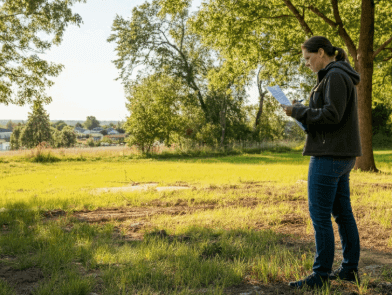Buying land for development is a strategic step toward building a thriving future, especially in an industry projected to reach $14.4 billion in revenue by 2025. Land in growing areas offers immense potential for appreciation, giving developers and investors an opportunity to significantly increase their returns. However, navigating the intricacies of land development can be daunting without the proper knowledge and expert guidance. That’s why experts like Steve Daria and Joleigh, renowned real estate investors and land buyers for cash, are here to help. They bring years of experience to the table, helping clients identify prime opportunities and avoid common pitfalls when buying land for development. Whether you’re seeking to build residential communities, commercial spaces, or other ambitions, having a well-informed plan is crucial. Don’t wait to secure your future in this lucrative market. Book a free discussion with Steve and Joleigh today and take the first step toward making your land development project a success!
Key Points
- Research the Location: Understanding the location is critical when buying land for development. Look for areas with growth potential, strong infrastructure, and favorable zoning laws to ensure a profitable investment.
- Evaluate the Land’s Condition: Before making a purchase, analyze the land’s topography, soil quality, and access to utilities. This will help you identify potential development challenges and avoid costly surprises later.
- Understand Zoning and Permits: Confirm zoning regulations and required permits to ensure the land aligns with your intended use. Missteps in this area can cause delays or even prevent development entirely.
- Calculate Total Costs: In addition to the purchase price, factor in development costs, taxes, and additional expenses like environmental testing or infrastructure setup. These costs can impact the overall feasibility of your project.
- Work with Experienced Professionals: Partnering with seasoned professionals like Steve Daria and Joleigh, experienced real estate investors and cash land buyers, guarantees a seamless process. Their expertise equips you with the knowledge to make confident decisions while steering clear of common pitfalls.
What does buying land for development involve?
Buying land for development involves purchasing a plot of land to construct buildings or improve its value for various uses, such as residential, commercial, or industrial projects.
The process begins with identifying suitable land in a prime location, often focusing on areas with growth potential or strong infrastructure.
Buyers should carefully assess the land’s condition—examining its topography, soil quality, and utility access—to ensure it aligns with their development requirements.

Researching zoning laws and securing necessary permits is also crucial, as these regulations determine what can be built on the land.
Financial planning is essential, as costs such as land surveys, environmental testing, and construction expenses can quickly add up.
Buyers should also conduct due diligence, such as checking for any legal or environmental restrictions tied to the property.
Typically, developers work with real estate experts, engineers, and legal advisors to streamline the process and avoid costly mistakes.
Overall, buying land for development can be a rewarding investment when approached with thorough preparation and careful planning.
Get Started: Get Your Cash Offer Below…
We are direct land buyers. There are no commissions or fees and no obligation whatsoever. Start below by sharing where your property is and where we can send your offer…
Is buying land for development a good investment?
Buying land for development can be a great investment if approached wisely and with proper research.
Land often appreciates in value over time, especially in areas poised for urban growth or economic development.
Unlike some other investments, land is a tangible asset, meaning its value won’t easily diminish as long as it’s maintained.
One of the major advantages is the flexibility it provides; land can be developed for residential, commercial, or agricultural purposes based on market demands.
However, it’s important to consider factors such as zoning laws, environmental requirements, and construction costs, which can impact profitability.
Successful developers often focus on purchasing land in regions with strong infrastructure and amenities to attract future buyers or renters.
While the upfront costs may be significant, the long-term returns often outweigh the initial investment.
By carefully evaluating market trends, risks, and opportunities, buying land for development can serve as a smart and profitable venture.
How can I evaluate if a piece of land is suitable for development?
- Check the Zoning Laws: Familiarize yourself with the zoning regulations of the area to determine the types of developments permitted on the land. This step makes sure your project follows local regulations, helping you avoid legal problems later.
- Inspect the Land’s Topography: Study the land’s physical features, such as slopes, soil quality, and drainage. Flat land with good soil and proper drainage is often easier and cheaper to develop.
- Review Access to Utilities: Confirm if essential utilities like water, electricity, and sewage systems are accessible. If they are not, installing them can significantly increase development costs.
- Assess the Location: Evaluate the land’s location based on factors like proximity to schools, transportation, and infrastructure. A well-located property is likely to attract more buyers or tenants after development.
- Conduct Necessary Surveys and Tests: Conduct land surveys and environmental assessments to identify potential issues, such as property boundary disputes or contamination risks. These assessments help ensure the land is safe and suitable for your project.
- Understand the Market Value: Research comparable land sales in the area to determine the fair market value. This ensures you won’t overpay and guarantees your investment delivers true value.
- Check Legal Restrictions: Determine if there are restrictions, such as easements or building codes, that could limit what you can do with the land. This helps you move forward with your plans without delays.

What are the common hidden costs when buying land for development?
When buying land for development, there are several hidden costs that buyers should be aware of to avoid surprises.
One common expense is the cost of land surveys, which confirm boundaries and identify potential issues with the property.
Environmental testing is also necessary to check for soil contamination or other problems that affect construction.
Zoning changes or permits can add costs, particularly if adjustments are needed to meet your development goals.
Utility installation, such as connecting water, electricity, and sewage systems, can be expensive if the land isn’t already equipped with these services.
Buyers might also face unexpected legal fees, especially when resolving disputes like unclear ownership or easement rights.
Additionally, site preparation costs can quickly add up, such as clearing trees, leveling the land, or addressing drainage issues.
Budgeting for these hidden costs ensures that buying land for development doesn’t strain your finances or delay your project.
Avoiding financial pitfalls requires thoughtful planning and guidance from trusted experts.
What legal documents should I review before buying land for development?
1. Title Deed
The title deed is crucial because it shows who owns the land and whether they have the legal right to sell it.
Make sure the document is authentic and free from any ownership disputes.
A clear title ensures you won’t face legal troubles in the future.
2. Zoning and Land Use Regulations
These documents outline how the land can be used for residential, commercial, or industrial purposes.
Review them to ensure your development plans align with the area’s zoning rules.
If the land needs rezoning, be prepared for additional costs and time to get approvals.
3. Survey Report
A survey report confirms the property boundaries and identifies any encroachments or easements.
This helps avoid conflicts with neighbors and ensures the land area matches what is listed in the sale agreement.
It’s also useful for accurately planning your development layout.
4. Environmental Clearances
Some areas require environmental approvals to ensure the land doesn’t have issues like contamination or risk of flooding.
Check these documents to ensure compliance with local environmental regulations.
Failure to address this could lead to penalties or delays in construction.
5. Tax Records and Encumbrance Certificate
Review the tax records to ensure the seller has paid all past property taxes.
The encumbrance certificate confirms that the land is free from loans, liens, or other financial obligations.
Both documents are essential to ensure a safe and hassle-free purchase.
How do I close the deal when buying land for development?
Closing the deal when buying land for development requires several key steps to ensure a seamless and efficient process.
First, confirm that all the required documents, such as the title deed, survey report, and tax records, are in order.
Conducting a final review with a legal advisor is also helpful to avoid any surprises or disputes.
Next, negotiate the terms of the sale, including the purchase price, and ensure these are clearly stated in a formal agreement.
Once both parties agree, proceed with arranging the payment, whether through financing or direct cash purchase.
Steve Daria and Joleigh, expert and seasoned real estate investors and land buyers for cash, can guide you in making the best decisions and ensuring a seamless transaction.
After payment, the final signing takes place, and the transfer of ownership gets recorded with the local authorities.
If you’re ready to start your land-buying journey, reach out to Steve Daria and Joleigh to get expert insights and support for a successful investment.
**NOTICE: Please note that the content presented in this post is intended solely for informational and educational purposes. It should not be construed as legal or financial advice or relied upon as a replacement for consultation with a qualified attorney or CPA. For specific guidance on legal or financial matters, readers are encouraged to seek professional assistance from an attorney, CPA, or other appropriate professional regarding the subject matter.
